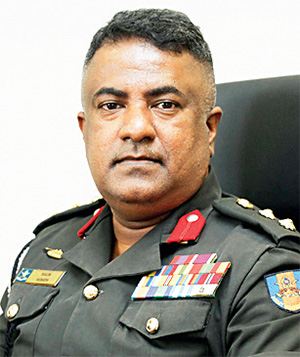Midweek Review
Vincent van Gogh’s Timelessness
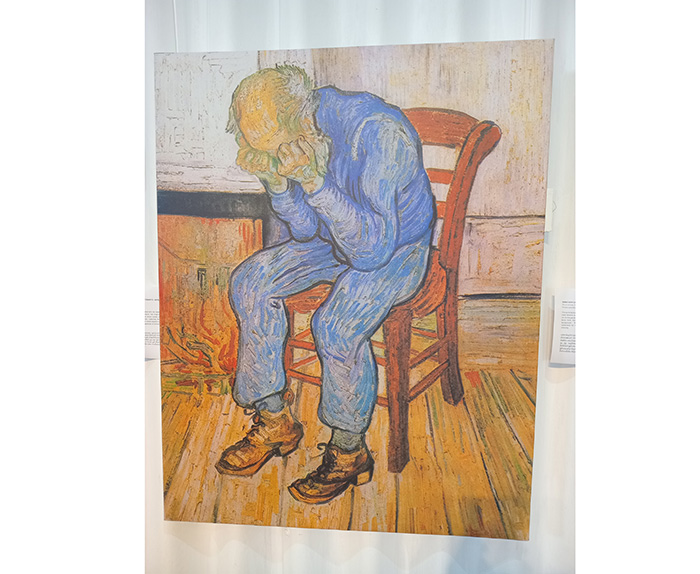
By Lynn Ockersz
Sadly, Marx saw humans,
In terms of only social classes,
And didn’t seem to see them,
In all their individual dignity,
But not so Vincent van Gogh,
The timeless painter,
Of the nineteenth century,
Who captured on bleeding canvas,
The universal anxieties and pain,
That lay bare the human condition.
Midweek Review
Post-Aragalaya look at security and related developments
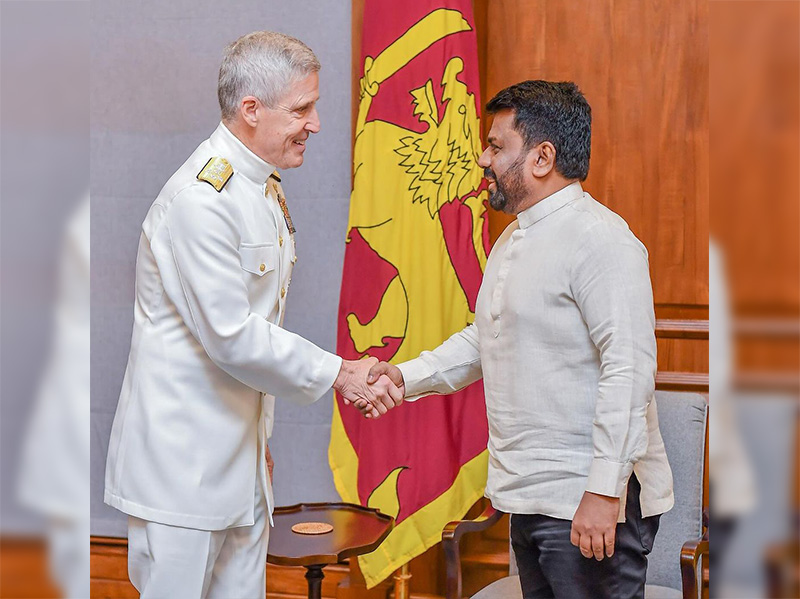
Colonel Nalin Herath
Referring to Israel’s war on Gaza, Defence Ministry Spokesman Colonel Nalin Herath speculated about further escalation though he refrained from commenting on the Jewish State’s relentless attacks in Lebanon and Iranian missile barrages directed at Israel. The Middle East is on the brink of a regional conflict, Herath declared, in an interview with Supreme TV. Since the interview, the war has taken a new turn with Israeli attacks on Lebanon-based UN peacekeepers causing injuries to personnel, including two Sri Lankan military personnel serving there and the killing of Hamas leader Yahya Sinwar during a chance encounter between Israeli troops and Hamas. Like LTTE leader Velupillai Prabhakaran, Sinwar, the alleged mastermind of the large-scale Oct. 07 Hamas invasion of southern Israel, the first such invasion of the Jewish territory since the first Arab-Israel war in 1948. Those who compared Sri Lanka’s war against the LTTE and the ongoing war should be able to differentiate the conflicts.
By Shamindra Ferdinando
The urgent need for a comprehensive examination of daunting political-economic-security-social challenges cannot be overestimated. Bankrupt Sri Lanka is at a crossroads as the Jathika Jana Balawegaya (JJB) seeks to consolidate its position with a convincing victory at the parliamentary election scheduled to be conducted in three weeks. Although its triumph is apparently a foregone conclusion, the Janatha Vimukthi Peremuna (JVP)-led JJB, however, faces formidable domestic and external challenges.
With the former main Opposition party Samagi Jana Balawegaya (SJB) and the former ruling party, the Sri Lanka Podujana Peramuna (SLPP, as well as the UNP-backed New Democratic Front (NDF) in disarray, President Anura Kumara Dissanayake’s JJB enjoys a clear advantage in such a scenario.
Regardless of putting up a brave patriotic face, the new party, Sarvajana Balaya does not appear to stand a chance at its first parliamentary election. Going by past experience, the local voters usually go with the trend set by the presidential election. To make matters worse, the opposition is badly split among the SJB, NDF and the SLPP. The SLPP that secured 145 seats, including 17 National List slots at the last parliamentary election, in August 2020, can be reduced to just one NL seat at the forthcoming election. The decision on the part of the Rajapaksas to field generally unproven Namal Rajapaksa on the SLPP NL meant that they realized the grave danger of the party being wiped out. Therefore, the Sarvajana Balaya may find the current ground situation intimidating, though several former SLPP parliamentarians, who have always watched over the country’s national interests, back entrepreneur Dilith Jayaweera’s outfit. However, since the presidential election, Sarvajana Balaya has lost Wimal Weerawansa and Gevindu Cumaratunga.
Defence Ministry spokesman and Director General of the Institute of National Security Studies (INSS) Colonel Nalin Herath recently discussed post-Aragalaya security challenges at different levels, taking into consideration both traditional and non-traditional threats.
During the discussion with Mariella Vandort on ‘Spotlight’ on Supreme TV, the Armoured Corps officer covered related issues, such as ex-military men joining the Russian and Ukrainian militaries, foreign relations where he underscored the need for, what he called, a middle-path, and Sri Lanka’s triumph over separatist Liberation Tigers of Tamil Eelam (LTTE), in May 2009 ,against grave doubts expressed by so-called experts.
At the onset, Colonel Herath explained how developments largely depends on sustainable security in an ever-changing globalized world and the responsibility on the part of political and military leaderships to protect the public. Emphasizing the need to neutralize and address both traditional and non-traditional threats, Colonel Herath made reference to the eradication of terrorism.
However, the interviewer failed to take up the origins of separatist terrorism in the ’80s and New Delhi’s role in the terror project that resulted in the formation of half a dozen terrorist groups.
Except the LTTE, the other groups joined the political mainstream during the late Ranasinghe Premadasa’s presidency (1990-1993). Against the backdrop of Anura Kumara Dissanayake, a member of the once-proscribed JVP becoming the President last month, the discussion should have covered the two southern insurgencies in 1971 and 1987-1990. Unfortunately, quite a significant development in our history didn’t receive the required attention. May be it was too dicey a topic to tackle under the current circumstances, especially for a serving military officer. In fact, the emergence of the JJB in mid-2019, a few months before the Presidential Election that was won by wartime Defence Secretary Gotabaya Rajapaksa, could have been examined, leaving out the JVP’s horrid past.
The Sri Lanka Army can quite rightly be proud of its record-defeating two insurgencies and winning a conventional war that the Western powers asserted was impossible. Of course, the Navy and Air Force, as well as police, including its Special Task Force, made an immense contribution, and the annihilation of the enemy (LTTE) couldn’t have been achieved if not for President Mahinda Rajapaksa’s steadfast leadership.
Unforgettable situation report
During the course of the interview, Colonel Herath disclosed that he had been with the 68.1 Brigade assigned to the 53 Division deployed at Vellamullivaikkal, on the Vanni east front, where the combined forces brought the war to a successful end. A smiling MoD spokesman recalled how he signed the situation report that dealt with the death of LTTE leader Velupillai Prabhakaran at 9.32 am on May 19, 2009.
Troops recovered Prabhakaran’s body that morning, the day after the conclusion of the Vanni offensive. Colonel Herath said the vast majority appreciated the successful war effort, though others quite conveniently forgot the sacrifices made by the military.
Responding to another query, the armoured corps officer recalled two incidents in the Vanni theatre where he survived death. Both incidents had been in the ’90s, one in Kilinochchi and the other at Oddusuddan off Nedunkerni, when the LTTE fired at the SLA escorting then de facto Defence Minister Anuruddha Ratwatte.
Incidentally, the writer had been among a group of journalists on their way to cover Minister Ratwatte’s visit to Oddusudan when the LTTE fired mortars. The buffel armoured personnel carrier carrying us ended up in a paddy field in the chaos and for about 30 minutes we were stuck there.
Although a conventional military threat appears to be unlikely, the 2019 Easter Sunday carnage underscores the responsibility on the part of the government to remain alert. Although Vandort made reference to Easter Sunday attacks as in emergency situations such as floods and Covid-19, yet the only post-war incident that grabbed international attention was not discussed. Nearly 50 foreigners perished in coordinated attacks on churches and five-star hotels that exposed the severe shortcomings in the political and military leaderships.
In the context of traditional and non-traditional threats, how do we categorize the unprecedented Easter Sunday bombings or Aragalaya (March –July 2022) that forced the democratically elected President out of Office. That removal, for whatever the reasons which contributed to public anger, cannot justify unconstitutional removal, while the armed forces and police just looked on. Perhaps the Defence Ministry-funded think tank INSS should thoroughly examine Aragalaya with a fine tooth comb. Their findings can be at least shared among the military top brass, State Intelligence Service (SIS), Directorate of Military Intelligence (DMI) and the IGP. The writer, however, understands the dilemma the armed forces are in as the JVP/JJB had been one of the parties directly involved in Aragalaya and, in fact, the only party accused of trying to take control of Parliament by physically storming it, using young activists. The JVP/JJB never denied that accusation. In fact, that accusation or declaration cannot be denied as senior party men were on record urging the people to overrun Parliament.
The SLA had no option but to use brute force to neutralize the serious threat to Parliament in July 2022, days before Gotabaya Rajapaksa gave up office.
Now, the JJB is on the verge of a historic parliamentary election victory. Veteran politician Mahinda Yapa Abeywardena, who had been the Speaker at the time of the Aragalaya, confirmed an external hand in the ouster of President Gotabaya Rajapaksa is in the National List of the NDF. Abeywardena is fifth on that list, headed by former Premier and leader of the Mahajana Eksath Peramuna (MEP) Dinesh Gunawardena. Although Abeywardena conveniently refrained from disclosing the name of the external party involved, the then lawmakers Wimal Weewawansa and retired Rear Admiral Sarath Weerasekera, as well as award-winning writer Sena Thoradeniya, alleged a clear US role in Aragalaya. On behalf of the US, its Ambassador here Julie Chung denied the accusation. However, the whole world knows that former Secretary of State John Kerry crowed publicly about how Washington spent millions of dollars for a regime change operation here in 2015 that ousted Mahinda Rajapaksa, along with similar covert acts to topple governments in several other countries.
No less a person than former President Ranil Wickremesinghe, as well as his predecessor Gotabaya Rajapaksa, too, alleged external interference. The incumbent government owed the public an explanation regarding the status of the investigations into the massive destruction caused by Aragalaya.
Those contesting on the NDF ticket backed Ranil Wickremesinghe at the recently concluded Presidential Election. It was the third defeat Wickremesinghe suffered at a presidential election, the first at the hands of Chandrika Bandaranaike Kumaratunga in 1999, followed by 2005. Mahinda Rajapaksa won the 2005 contest by less than 200,000 votes due to the LTTE and TNA (Tamil National Alliance) ordering the northern voters to boycott that election.
Impact of economic crisis on armed forces
Colonel Herath also discussed the requirement to maintain the military strength even during the economic crises and why sufficient investment of public funds is essential. The Colonel didn’t mince his words when he emphasized such investments shouldn’t be considered a waste of money, under any circumstances. Let us hope the executive and the legislature, in unison, accept the need for a robust military. Colonel Herath stressed the need to enhance fighting capability. Over 15 years after the conclusion of the war, and the retirement of thousands of fighting men, the military must take every possible measure to retain their fighting capability.
Colonel Herath placed the current strength of the SLA at 150,000 down from 205,000 at the time of Sri Lanka’s triumph over terrorism. Perhaps, the new government should explain whether it intends to carry out the Wickremesinghe-Rajapaksa government decision to reduce the SLA strength to 100,000 by 2030.
Amidst the continuing economic difficulties that made expected investments on armed forces impossible, foreign powers have stepped in. The recent visit undertaken by Adm. Steve Koehler, commander, U.S. Pacific Fleet, to Colombo, and the transfer of Beechcraft King Air 360ER aircraft underscored the US commitment to strengthening partnerships in the Indo-Pacific and advancing, what the superpower called, a shared vision for peace and stability by upholding the rules based international order.
The US and its allies, including India, have invested in the Sri Lankan armed forces. The China Bay-based No 03 Maritime Squadron consists of dedicated US and Indian maritime surveillance aircraft. The squadron is expected to take delivery of an ex-Australian Air Force Beech 350 King Air patrol aircraft before the end of this month. The US and its allies seem to be inclined to go ahead with their overall strategy vis a vis Sri Lanka, adopted during Wickremesinghe’s presidency. The US decision to go ahead with the handing over of the fourth US Coastguard Cutter to Sri Lanka, gratis, in the coming year, further emphasized their strategy. All that we can say to the new government is beware of Greeks bearing gifts.
Colonel Herath explained the measures taken by the previous government to address the contentious issue of Sri Lankans on the Russia-Ukraine front. According to him, there had been 470 to 500 officers and men involved on both sides and substantial progress was made during discussions in Moscow and with the Russian Embassy in Colombo. It would be pertinent to mention that the Russia-Ukraine conflict is actually a war between the Russian Federation and the West in Ukraine.
Russian Ambassador to Colombo Levan Dzhagaryan, during a recent conversation with this writer, stressed how the combined West utilized the Ukrainian conflict/territory to achieve their objective of bringing NATO to Russia’s border if not for the counter measures now being implemented by Moscow.
Unfortunately, India, the beneficiary in the Ukraine-Russia war as a result of a massive increase in cheap crude oil purchases since 2022, is trapped in the US strategy.
India’s decision not to sign a Joint Letter supporting the UN Secretary General Antonio Guterres in the wake of the recent declaration by the Minister of Foreign Affairs of Israel designating the Head of the premier world body as “persona non grata”, underscored New Delhi’s dilemma. Among others who refrained from backing Chilean coordinated efforts were the US along with its close allies the UK, Japan and South Korea, considered by some to be its lap dogs.
There is no other way to explain India backing Ukrainian and Israeli war efforts as discussed by the international media. But, the US, British and Australian reactions to the continuing diplomatic row between India and Canada over the killing of Sikh activist and naturalized Canadian citizen Hardee Singh Nijjar in British Columbia last year is a grim reminder of Western double standards.
Canadian Premier Justin Trudeau’s Oct. 15 declaration on the conduct of India and its representatives based in Canada underscored Ottawa’s stand that it wouldn’t under any circumstances accept the Modi government’s actions. The Canadian declaration that Indian High Commissioner Sanjay Kumar Verma had a hand in the Nijjar affair caused irreparable damage to Canada –India relations.
Perhaps Canada, having alleged Sri Lanka committed genocide during war against Tamil separatism, should inquire how many ex-Sri Lankan terrorists received Canadian citizenship. Similarly, many wanted for terrorism in India are Canadian passport holders now.
Post-Aragalaya development
The moving of the Court of Appeal against the Defence Ministry decision to collect weapons issued for personal protection under license to selected persons is an eye-opener. The petition underscores the failure on the part of the then government and the security establishment to provide security during Aragalaya when law and order simply disintegrated.
Close on the heels of Anura Kumara Dissanayake’s victory at the Sept. 21 Presidential Election, the Defence Ministry ordered those having licensed weapons and ammunition to hand them over to the Commercial Explosive Firearms and Ammunition Procurement Unit (CEFAP) at Sri Lanka Navy camp, in Welisara, before Nov. 07, this year.
The Defence Ministry declared that this order did not apply for weapons used for the protection of property/crop and sports activities.
H.D. Navinthaka de Silva, CEO of Avenra Hotel Group, in his petition, argued that the Defence Ministry decision posed a significant risk to his safety.
The Secretary of the Ministry of Defence, the Director of the State Intelligence Service, and the Acting Inspector General of Police have been named as respondents in the case. Filed through Attorney-at-Law Sanath Wijayawardena, the petition claimed that Navinthaka de Silva obtained licensed firearms from the Ministry of Defence around 2012 or 2013 due to serious personal threats.
The petitioner emphasized that his businesses, including hotels, suffered considerable damages during recent political unrest, compounding his security concerns.
Declaring that his plea for reconsidering the Defence Ministry decision pertaining to him, petitioner has requested the Court of Appeal to issue a writ order invalidating the Defence Ministry’s order. The petitioner also sought an interim injunction be issued suspending the implementation of the directive until a final decision is reached after the hearing of his case.
Grandeeza, one of the hotels owned by the Avenra Hotel Group situated at Katunayake, on the main Colombo-Negombo road, and just 15 minutes walking distance from the Katunayake airbase, was set on fire and looted in broad daylight. The same fate befell two other hotels owned by them in the Negombo division. The destruction caused by Aragalaya had never been properly established and none of those responsible was brought before a court of law though some progress was made in respect of MP Atukorale’s killing in May 2022.
The operation carried out by Aragalaya was so meticulously planned that perhaps they would have gone ahead with countrywide attacks even if Temple Trees didn’t make the foolish decision to unleash SLPP goons on the Galle Face protesters. As that was used as the pretext to launch violence against the then SLPP government politicians and their friends and relatives with meticulous intelligence from the evening of May 09, 2022, leaving properties looted and torched across the country.
The Avenra CEO’s petition reminds the government of its fundamental responsibility to take all possible measures to protect citizens.
Midweek Review
Easter Sunday carnage: Mysterious decisions, failures and politics of opportunity
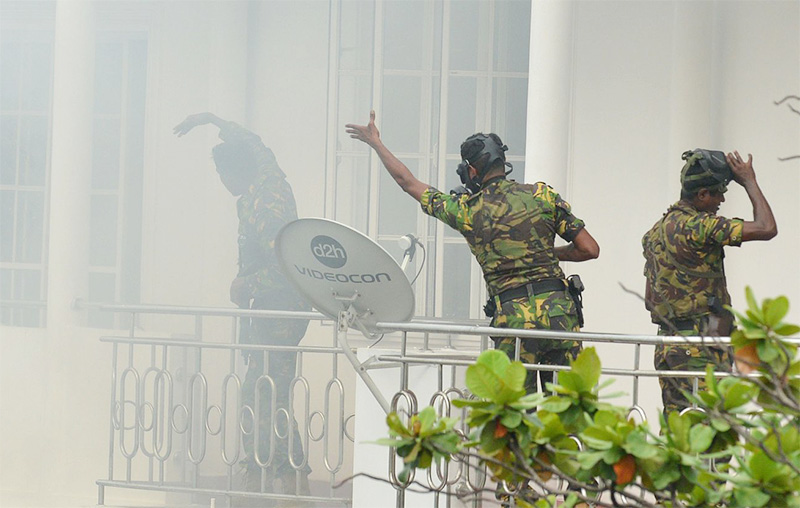
The SLPP’s decision to reach an agreement with Maithripala Sirisena in the run-up to the general election in August 2020 is nothing but a fatal decision. The SLPP disregarded Sirisena’s pathetic and catastrophic failure to thwart the Easter Sunday carnage when the party finalized an electoral pact that enabled the SLFP to contest on the SLPP ticket. Sirisena returned to Parliament from Polonnaruwa on the SLPP ticket. The former President was among 12 SLFPers elected on the SLPP ticket. One SLFPer entered through the SLPP National List, while another was elected from Jaffna, under the SLFP symbol hand.
By Shamindra Ferdinando
Janatha Vimukthi Peramuna (JVP) and Jathika Jana Balawegaya (JJB) leader Anura Kumara Dissanayake is the fourth President trying to get to the bottom of the April 2019 Easter Sunday carnage, the only post-war major violent incident. If his predecessors in the top seat had been compromised in some way or another, and that was the reason for their failure, then he is our true hope!
The nearly 30-year brutal internecine war that appeared to drag on endlessly was brought to a successful conclusion in May 2009 to the surprise of many, through proper leadership, both militarily and politically, with the Mahinda Rajapaksa Government deciding to fight it to a finish, unlike previous regimes. Even some of the former security forces top brass, also made a business out of it when they were at the helm. Having witnessed the sorry way the LTTE challenge was met previously, war-winning Army Commander Sarath Fonseka, too, made a prophetic public pronouncement that he would not leave the war to a successor to fight.
Maithripala Sirisena, who had served as the President, in addition to being the Minister in charge of Defence and Public Security, as well as Commander-in-Chief of the armed forces, at the time of the multiple Easter suicide attacks, was faulted by the Supreme Court in January 2023. The SC ordered him to pay Rs. 100 mn. Sirisena paid the entire amount by August 2024. The final instalment amounted to Rs 12 mn.
The failure on the part of Sirisena’s administration to thwart the attacks, blamed on the now proscribed National Thowheed Jamaat (NTJ), facilitated Sri Lanka Podujana Peramuna (SLPP) candidate Gotabaya Rajapaksa’s sweeping victory at the Nov. 2019 presidential election. There is no doubt about that against the backdrop of the Gajaba Regiment veteran repeatedly assuring the country that security would be restored. Therefore, the crux of the matter is whether the wartime Defence Secretary ordered the Easter Sunday carnage for his benefit, while he and his powerful family were out of power. If it had been the case, as alleged by his opponents, there should be a plausible explanation as to why the extremist NTJ wanted to promote Gotabaya Rajapaksa’s candidate at all, as most Muslims by then detested the Rajapaksas because of their perceived bias towards Sinhala extremists, like Bodu Bala Sena. Such feelings among Muslims were obviously exploited by interested parties with the help of some of their leaders. Even corrupt monks, too, were exploited by them with foreign trips, and what not, to fan flames on the majority side. And, obviously, their ultimate target was the war-winning Rajapaksas for defying the West and destroying their pet Tigers.
Those who planned and executed the Easter Sunday terror project, Mohamed Zahran Mohammed Hashim (Shangri-La bomber) and Mohommad Ibrahim Ilham Ahmad (Shangri-La bomber) and Mohommad Ibrahim Insaf Ahmad (Cinnamon Grand bomber) and rest of the team, obviously couldn’t have been unaware of the opportunity the bloodbath afforded to the SLPP candidate. May be it was yet another plot to destroy the Rajapaksas as the dastardly attacks in a way helped the Rajapaksas to return to power, while other sinister plans against them were being brewed.
The Catholic Church wholeheartedly backed Gotabaya Rajapaksa at the 2019 presidential election. The top leadership had been so confident the new President would ensure investigations free of political interference, the Church backed the SLPP candidate unreservedly at the August 2020 parliamentary election as well. The Church also declined an offer made by President Gotabaya to nominate a person of its choice to the Presidential Commission of Inquiry (PCoI) on the Easter Sunday attacks. The Church obviously felt that nomination of a person perceived to be their nominee could undermine the PCoI named by Sirisena in Sept. 2019.
Hence, the five-member PCoI, headed by Supreme Court Judge Janak de Silva, only consisted of Appeal Court Judge Nissanka Bandula Karunarathna, retired Judge of the Court of Appeal, Nihal Sunil Rajapaksa, retired Judge of the High Court, Bandula Kumara Atapattu, and retired Ministry Secretary Ms. W.M.M. Adikari, continued with the Inquiry with no representation from the Catholic Church.
Sirisena appointed the PCoI as the report presented by the Parliamentary Select Committee (PSC) that conducted an inquiry (May-Oct. 2019) into Easter Sunday carnage showed him in a bad light. Sirisena obviously wanted to clear himself, hence the appointment of the PCoI.
Disastrous move
Trouble started soon after the PCoI handed over its final report to President Gotabaya Rajapaksa on Feb. 01, 2021. The President had earlier received the first and the second interim reports which were handed over to him on Dec. 20, 2019 and on March 02, 2020 respectively. Director General, Legal Affairs of the Presidential Secretariat, Hariguptha Rohanadheera, handed over the report to Attorney General Dappula de Livera, PC, on February 25. Two days before Rohanadheera met Livera, President Rajapaksa caused himself and his government irreparable damage by appointing a six-member Committee, consisting of SLPP parliamentarians, to examine the report.
A statement issued by the Presidential Media Division declared that the Committee had been entrusted with a wide ranging mandate. The PMD explained: “Identifying the overall process, including the measures that need to be taken by various agencies and authorities such as the Parliament, judiciary, Attorney General’s Department, security forces, State Intelligence services and implementing recommendations as stipulated by PCoI to avert recurrence of a national catastrophe of such magnitude is the prime responsibility of the said Committee.”
The Committee, chaired by President’s elder brother Chamal Rajapaksa, included Johnston Fernando, Udaya Gammanpila, Dr. Ramesh Pathirana, Prasanna Ranatunga, and Rohitha Abeygunawardena.
Former President Gotabaya Rajapaksa owed the country an explanation as to why he named such a Committee that only strengthened accusations regarding his role in the Easter Sunday terror project.
‘Sri Lanka’s Easter Tragedy: When the Deep State gets out of its Depth
’, authored by Prof. Rajan Hoole meticulously dealt with the issues at hand. In spite of its launch in late Sept. 2019, just about five months after the Easter Sunday massacres, Hoole’s work didn’t receive the expected response but the course of action President Rajapaksa resorted to as regards PCoI, in Feb. 2021. influenced the public. By then, the Sinhala version of the Prof.’s work was available.
Gotabaya Rajapaksa’s government conveniently failed to implement the PCoI recommendations. In July 2021, less than five months after the President had received the PCoI report, the Catholic Church (National Catholic Committee for Justice to Easter Sunday victims), politely called for the implementation of the recommendations. Their plea was disregarded.
Director, State Intelligence Service (SIS) Senior DIG Nilantha Jayawardena, who had been the main culprit, as asserted by the PSC and the PCoI responsible for security failure, remained in the police till July 2024. Jayawardena served as Senior DIG in charge of the Central Province before receiving appointment as Senior DIG (Administration), in other words, the number two in the Department.
Having raised the Easter Sunday carnage at the Geneva-based United Nations Human Rights Council, and with the Vatican, the Church, without hesitation, backed the unprecedented public protest campaign (March-July 2022) that forced Gotabaya Rajapaksa out of office. That brought UNP leader Ranil Wickremesinghe into power in July 2022. Having declared his intention, in Sept. 2022, to secure the assistance of Scotland Yard, Wickremesinghe quickly and conveniently forgot his promise as he slowly turned around the economy. Emboldened by apparent success on the economic front, Wickremesinghe made a catastrophic bid to postpone presidential election. The rest is history.
PCoI recommendations regarding MS, RW
The PCoI report differed from the PSC in respect of the findings regarding political party leaders. Based on the PCoI findings, the Church, in July 2021, questioned President Rajapaksa as to why punitive recommendations, pertaining to Yahapalana President Sirisena (Final Report of PCoI. Vol 01. Page 265) hadn’t been implemented. The Church also demanded to know as to why Premier Wickremesinghe hadn’t been investigated for his shortcomings and failures (Final Report of PCoI. Volume 01. Pages 276-277).
The PCoI recommended that the AG consider criminal proceedings against Sirisena, under any suitable provision in the Penal Code. The Church found fault with the PCoI for not making any specific recommendations in respect of Wickremesinghe after having blamed him for contributing to the overall security failure.
The PCoI asserted that Wickremesinghe’s negligent approach towards extremism had been one of the primary reasons for the government’s failure to counter the growing threat. Therefore, the Premier’s failure facilitated, what the Church called, the build-up of Islamic extremism to the point of the Easter Sunday attack.
Within three weeks of his election, President Dissanayake visited St. Sebastian’s Church at Katuwapitiya, Negombo, where he assured justice for the Easter Sunday victims. One of the key issues that should receive the attention of the investigators is the continuing controversy over the Easter Sunday mastermind.
Who actually masterminded, or engineered, the Easter Sunday terror project? Retired Rear Admiral Sarath Weerasekera, who served as Public Security Minister during Gotabaya Rajapaksa’s tenure as President, declared Mohammadu Ibrahim Mohamed Naufer alias Naufer Moulavi as the mastermind. However, many people are skeptical about the claim. The Kattankudy-born man, who had been arrested in Dambulla, a few days after the Easter Sunday blasts, is in custody pending investigations and court proceedings.
Top spokesperson for the Catholic Church Rev. Father Cyril Gamini Fernando recently declared a person identified as Abu Hind as a key figure in the Easter Sunday conspiracy. Widely believed to be a creation of the Intelligence Bureau (IB) of India, that technical persona, or avatar, infiltrated the network planning Easter Sunday attacks. Those who still suspect an Indian had had a hand in the terror project haven’t explained as to why New Delhi provided specific intelligence on three occasions before the suicide attacks. The use of such avatars is all part of counterintelligence strategy employed not only by India but many other countries as well. So was it a foreign plot or something on those lines? No wonder foreign personnel were crawling over some of the attacked places, like the Colombo Shangri-La, no sooner it happened, and even before some of our own investigators got down to work.
Dematagoda link
But have we paid sufficient attention to the family of wealthy spice exporter Mohammed Yusuf Ibrahim who live at Mahawila Uyana Road, Dematagoda. If not for their financial and moral support, the Easter Sunday operation couldn’t have been mounted under any circumstances. Would it be unfair on our part to ascertain them as the Easter Sunday masterminds or prime facilitators? The question is whether Easter Sunday strikes could have materialized without the involvement of the Ibrahim family.
One of Ibrahim’s sons, Mohommad Ibrahim Ilham Ahmad along with Mohamed Zahran Mohammed Hashim mounted an attack on Shangri-La. Ilham’s brother, Mohommad Ibrahim Insaf Ahmad blasted himself inside the Cinnamon Grand hotel. The two brothers are believed to have first met Zaharan at a wedding ceremony in the East. The two brothers may have also met Zaharan in Kurunegala, home town of Zaharan’s wife Abdul Kadar Fathima Hadiya. It would be pertinent to mention that Ilham had managed their spice farm in Matale.
Fathima Jefri, the wife of Ilham, detonated a bomb on the first floor of their three-storey luxury home when investigators came to their place to gather evidence. The blast killed three CCD (Colombo Crime Division) personnel who entered the house, as well as her three sons. Fathima, in her early 20s, had been pregnant at the time.
Mohammed Yusuf Ibrahim, who had been the President of the Pettah Traders Association, was among the JVP National List nominees for the 2015 parliamentary election. Of course at the time the JVP accommodated the wealthy trader on its National List, the deadly ‘religious’ plot may not have been conceived. Therefore, it wouldn’t be fair to demand an explanation from the JVP or JVP-led JJB, now in power ,regarding the inclusion of Mohammed Yusuf Ibrahim on their 2015 National List.
Prominent lawyer Hejaaz Hizbullah, who had been detained in April 2020 in connection with the Easter Sunday carnage, was granted bail and released in Feb. 2022. Investigators failed to link Hizbullah to the Easter Sunday plot though he professionally knew the Ibrahim family.
Instead of playing politics with the issues at hand, the government should undertake a thorough review of all available information. The truth is that the radical preacher Mohamed Zahran Mohammed Hashim had been under investigation years before the Senior DIG Jayawardena, in his capacity as Director SIS received the first Indian intelligence alert on April 04, 2019.
Jayawardena’s failure to act is inexplicable as on his request the entire investigation on the extremist had been brought under the SIS on April 08, 2018, a year before the attacks. The delay on the part of the Attorney General’s Department in providing required instructions/advice pertaining to extremist activity to the police, too, contributed to the overall security failure. The PCoI recommended disciplinary action against State Counsel Malik Azees and Deputy Solicitor General Azad Navavi.
The Yahapalana government disregarded the then Justice Minister Dr. Wijeyadasa Rajapakse’s dire warning issued in Parliament in mid Nov. 2016 regarding radicalization of the local Muslim community against the backdrop of some Sri Lankans joining the Islamic State (IS). A section of the government parliamentary group and other interested parties lambasted Wijeyadasa Rajapakse, a President’s Counsel, over his prima facie suspicions. The Justice Minister wouldn’t have made such a grave declaration, in Parliament, if he was not sure about what he was talking about.
What really made both the political and intelligence apparatus turn a blind eye to extremism? The shocking revelation made by Yahapalana Minister Harin Fernando, immediately after the Easter Sunday carnage that his father received a specific warning on April 20 regarding the impending attacks from a CID investigator, underscored a pathetic state of affairs.
As a responsible Cabinet Minister there cannot be any doubt that he alerted Premier Ranil Wickremesinghe and Deputy Defence Minister Ruwan Wijewardene regarding the impending attacks.
Collective int’l failure
The PSC in its report questioned the failure on the part of SIS to act swiftly and decisively against the backdrop of information available on active extremist groups, including arrest warrant issued on Shangri-La bomber Mohamed Zahran Mohammed Hashim way back in March 2017. Having found fault with the SIS Chief, the PSC headed by the then Deputy Speaker Ananda Kumarasiri, asserted that Defence Secretary Hemasiri Fernando, IGP Pujitha Jayasundera, Chief of National Intelligence retired DIG Sisira Mendis and Director of Directorate of Military Intelligence (DMI) Brigadier Chula Kodituwakku, in addition to the SIS Chief, were collectively responsible for the catastrophic security failure.
The need to examine the CID and TID response to the extremist threat, as well as the impact of the 2018 Oct. political conspiracy to bring in Mahinda Rajapaksa as PM, should also receive the attention of the new government. The bottom line is that the intelligence services had loads of information on the NTJ and they should have been able to thwart the deaths of 270 people and injuries to over 500 even with Indian warning. That is the truth.
Allegations directed at retired Maj. Gen. Suresh Salley regarding his direct involvement with the suicide squad should be investigated, taking into consideration the overall failure on the part of the SIS, Secy Defence, IGP, CNI and DMI to thwart the Easter Sunday plot. The investigation should seek to ascertain whether Salley, in spite of being attached to our High Commission as Minister Counsellor in Kuala Lumpur, influenced the DMI.
Following extremely serious allegations pertaining to Salley’s role in the Easter Sunday plot made by the UK’s controversial Channel 4 well-known for doing hatchet jobs, about an alleged clandestine meeting between the former DMI chief and the suicide squad at an estate in the Puttalam district in Feb 2018, President Wickremesinghe appointed a three-member Committee in Sept., 2023 to investigate the allegations. Salley, in response to a questionnaire posed to him by Channel 4, claimed that between Dec. 2016 and Dec. 2018 he left Malaysia only once for a week in Dec .2017 to visit Colombo. And he hadn’t left Malaysia for any other country during this period. This should be investigated. Having served as head of DMI from Oct. 2012 to Nov. 2016, he received a diplomatic appointment. Brig M D U V Gunathilake succeeded Salley. But at the time of the Easter Sunday carnage Brig. Chula Kodithuwakku had been at the helm of the DMI.
The committee, chaired by retired Supreme Court Justice S.I. Imam, consists of retired Air Force Commander A.C.M. Jayalath Weerakkody and President’s Counsel Harsha A.J. Soza PC.
In June 2023, Wickremesinghe appointed a Committee, headed by retired High Court judge Ms. A.N.J. De Alwis, to probe the SIS and CNI and other related services regarding the handling of the Easter Sunday intelligence warnings received from India and local investigations carried out before that. The Committee included SLAS special grade Officer Ms. K.N.K. Somaratne and Attorney-at-Law W.M.A.N. Nishane.
Wickremesinghe’s failure to release the reports, before the Sept. 21 presidential election, is baffling. The UNP leader’s successor President Dissanayake is yet to release the reports. As demanded by the Catholic Church and former MP Udaya Gammanpila on behalf of the Opposition, the reports should be released. The reports should be able to shed light on the entire intelligence apparatus and when examined along with all other material available can expose the murder plot. The need to identify conspirators at all levels regardless of their standing in the society cannot be disregarded.
Midweek Review
Humanities in the ‘art’ of healing: A case for subject integration

“Medical intervention in someone’s life is a break-in to their world. In a way, it’s a violation of their world that turns them into dependents.”
Luce Irigaray (From her book, “Je, Tu, Nous”: toward a culture of difference)
by Susantha Hewa
Luce Irigaray’s (French feminist, philosopher, psychoanalyst and cultural theorist) above quote may, at a glance, seem defiant or even impudent. Perhaps, it is not so. Anyhow, the incorporation of “Medical Humanities” into medicine curriculum, which was the subject of Randima Attygalle’s interview with Dr. Santushi Amarasuriya, published in The Sunday Island of October 6, 2024, may perhaps resonate with the undertones of Irigaray’s quote above. Possibly, in light of what Dr. Santushi Amarasuriya, Clinical Psychologist and Head of the Department of Medical Humanities says about the new discipline- to quote: “It helps medical practitioners to reorient themselves into a holistic and person-centered approach to health care” – may help us to get a more nuanced understanding of Irigaray’s seemingly confrontational sentiment.
The above interview brings to light the important role the Department of Medical Humanities (established in 2016) is playing to improve the quality of medical education given to prospective healthcare professionals. In the words of Dr. Amarasuriya, the goal of medical humanities is “to foster compassionate care, professionalism and ethical practice among medical and other health care professionals, whilst also being sensitive to the socio-cultural context in Sri Lanka”. This will be good news for the citizens who certainly deserve a better healthcare service. It was not so long ago that there were tragic episodes related to “substandard medicine” undermining patients’ right to life and proper health. It goes without saying that the country was grateful to all those who helped expose the alleged corruptions related to it. Those who have read the text of the interview may have rejoiced at the news of the said upgrading of the syllabus. Surely, the society should be grateful to all those academics and professionals who have contributed to the creation of the new department.
As we know, empathy humanises the relationship between the doctor and the patient, which will be beneficial to both parties. Incidentally, as Dr. Joe Schwarcz, in an article titled, “Would Osler stand by his famous quote today?”, where he refers to Prof. William Osler- one of the founders of the Johns Hopkins University School of Medicine- says that the latter had used to tell his students, “Listen to your patient, he’s telling you the diagnosis”! And, more interestingly, Dr. Michael McCarthy in his article “The importance of humanities in medicine” notes, “Legend has it that Dr. William Osler prescribed a reading list to his students, books not only about physiology and science, but classic literature. He was able to see that “Don Quixote” and “Gray’s Anatomy” both had indispensable value to a physician”. Perhaps, no one would grudge the apportioning of due respects to Dr. Osler, who would have realized the crucial importance of medical students reading literature so as to become more proficient doctors- to cultivate a “holistic and person-centered approach to health care”.
In the above two extracts of Dr. Osler, the first – “Listen to your patient, he’s telling you the diagnosis” – underlines the importance of empathy between the medic and the patient. Consider the famous lines:
“A glance at our rags would be more
Revealing. One and the same cause wears out
Our bodies and our clothes.” (Bertolt Brecht’s poem, “A worker’s speech to a doctor”)
Surely, Brecht’s somewhat incisive “diagnosis” implied in the above lines is beyond the jurisdiction of the doctor, but it doesn’t detract from Dr. Osler’s advice to his students to listen to their patients with more empathy. Further, Brecht’s relevance in the context is felt more when we come to the second excerpt alluded to Dr. Osler, which says that he prescribed to his students “books not only about physiology and science, but classic literature”. It signifies the substantial role humanities can play in enhancing medical practice, which, by the way, is an illustration of the useable relatedness of all disciplines, which we usually keep separated for convenience.
It’s no news that frequently a result is produced by more than one seemingly dominant cause. Yet, it is easy to overlook all the underlying causes of an event. Often, we depend on researchers and experts to show us the numerous underlying causes of a single event, say – 9/11 attacks in 2001, tsunami in 2004 or Covid19 epidemic in 2019 – that we begin to appreciate there being more to something than meets the eye. Hence the need for the collaboration of customarily discrete disciplines, i.e. medicine, history, mathematics, literature, etc., for a fuller understanding of any issue, which highlights the value of the new-fangled programme (Medical Humanities).
Of course, in designing syllabuses, it wouldn’t be easy to strike a fine balance between a dogged focus on one field of expertise and an obsession with a more eclectic approach covering several subjects with the aim of bringing the best of benefits to the society. The best option may be to introduce the right amount of the seemingly “external” ingredient at the right time to enrich the quality of the cocktail, as the University of Colombo Medical Faculty has done. As Prof. William S. Beck has said, “Fields of learning are surrounded ultimately only by illusory boundaries—like the “rooms” in a hall of mirrors. It is when the illusion is penetrated that progress takes place. … science is a vital part of our culture, our culture is part of it, it permeates our thinking, and its continued separateness from what is fondly called “the humanities” is a preposterous practical joke on all thinking men. (Modern Science and the Nature of Life).
Perhaps, we can be optimistic that other “privileged” disciplines would take a cue from the Colombo Medical Faculty to broaden and enhance their programmes by integrating traditionally alienated disciplines. Surely it would help usher in a more people-centred education in the country.
-

 Sports4 days ago
Sports4 days agoOshara making huge strides in cricket in UK
-
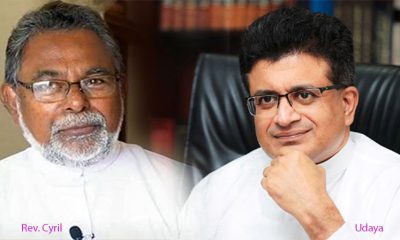
 News5 days ago
News5 days agoChurch not interested in reports sought by Gammanpila: Spokesperson
-

 Editorial6 days ago
Editorial6 days agoMuch-maligned Manape
-

 News5 days ago
News5 days agoJohnston missing amid probe into illegally assembled BMW
-
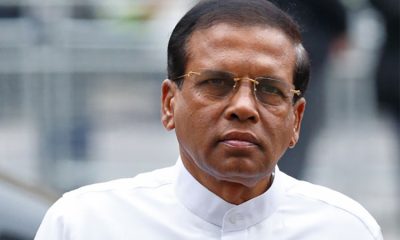
 News5 days ago
News5 days agoSirisena teases 2018 PM ouster secret, urges clean leadership
-
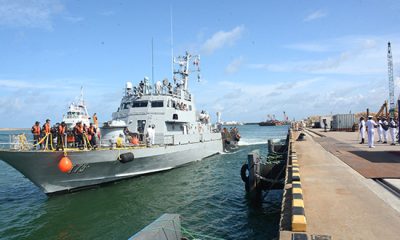
 Latest News4 days ago
Latest News4 days agoINS Kalpeni arrives in Colombo
-
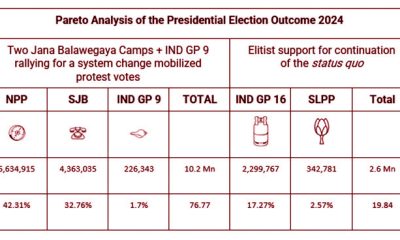
 Opinion2 days ago
Opinion2 days agoA Pareto analysis of ‘Jana Balawegaya’ force
-
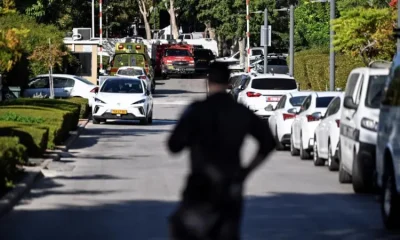
 Latest News4 days ago
Latest News4 days agoDrone ‘launched towards’ Israeli PM Netanyahu’s home


